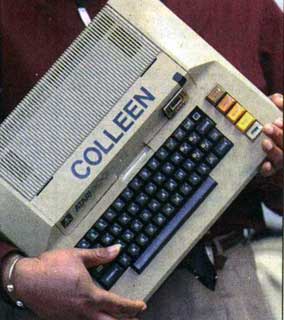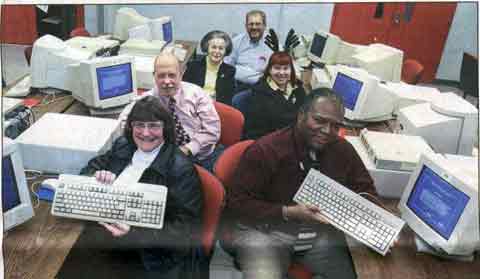|
The
NewsSun
Waukegan, Illinois
Friday December 20, 2002 |
|
"Twenty years now hopefully we'll have some of the things I saw in
Star Trek..."
Dwight "J.J." Johnson, Lake County
Computer Enthusiasts member
|
|
Computer
connoisseurs
Club members exchange
expertise, learn latest cyberworld technology
|

Dwight "J.J." Johnson or Waukegan holds an
Atari 800 computer that he wants cremated with him when he dies.
|
|
STAFF WRITER
NORTH CHICAGO -- Dwight "J.J." Johnson zips open a bulky, padded
suitcase and carefully pulls out a flat, box-shaped item covered with a
faded brown sleeve. If it appears that he's handling this item with care,
that's only because he is holding history in his hands.
"This one here is my baby -- my first Atari computer," he says,
unveiling the caramel-colored keyboard and inspecting its thumb-sized
function buttons. "It's in my will to be cremated with me."
Eyeing the 20-year-old relic, which was among the trailblazers that
ushered the computer age into the American household, Jim Rutledge of
Waukegan offers a suggestion: "You sure you don't want to donate this to
science?"
Laughter then fills the Learning Resource Center at Great Lakes Naval
Training Center. These connoisseurs take their computers seriously, but
not that seriously.
|
20th anniversary
Johnson and Rutledge are members of the Lake County Area Computer
Enthusiasts (LCACE), a non-profit organization that has grown along with
the home-computer generation -- the group will celebrate its 20th
anniversary in April, and is looking to expand in the era of e-mail in
every household.
On a recent evening after work with a private contractor on the Great
Lakes campus, several group members gathered in a relatively modern
computer room to check out the vaunted Atari 800 and swap tales about
their experiences with the LCACE.
"I've been using computers since about '80 or '81, but computers were
starting to change into things I wasn't really sure about, so I needed a
little help," said Linda Busch, who joined the LCACE in 1998 and has since
become the group's president. |
|
"I don't know computers very well, but these guys do," said LCACE
member Donna Kalinoski, one of the legions of Americans who grew up on
typewriters but is now embracing the brave but often intimidating new
cyberworld. "The great thing about our meetings is that we usually have
some kind of demonstration of a new product that we can all learn from."
With a current membership of around 47, the LCACE meets at the
Grayslake Area Public Library on the second Saturday of each month, with
various members bringing along the new toys they've come across at
computer expos and Circuit City.
"It's like show-and-tell back in school," Johnson said with a laugh.
"One time, a guy brought in a digital camera, and after he showed it off
everyone was like, 'I got to get one of those.'"
|
 |
COMPUTER CLUB FACTS
Name:
Lake County Area Computer Enthusiasts
Meetings: Noon on the second Saturday of every month (except July and
December) at the Grayslake Area Public Library, 100 Library Lane, Grayslake.
Phone: For more information, including details on memberships, call
(847) 623-3815
Web site:
www.lcace.org
|
|
Among members of Lake County Area Computer
Enthusiasts are (from left) Donna Kalinoski of North Chicago, Mike McEnery
of Zion, Robin Seidenberg of Grayslake, Jim Rutledge of Waukegan, Linda
Busch of Round Lake and Dwight "J.J." Johnson of Waukegan
|
Hearing this, Kalinoski said "did you mention our motto?" Johnson
smiled and replied, "Members Helping Members ... Spend Money." Actually,
it's only "Members Helping Members." Rutledge, who admitted that Johnson
bugged him about joining the LCACE for five years before he took the
plunge, said the strength of the meetings is the free exchange of
expertise in what could be an overwhelming field.
Varied interests
"You can kind of separate out the members in a couple of ways," said
Rutledge, pointing around the room at his fellow LCACE devotees. "I'm into
networking, Robin (Seidenberg) is into genealogy, J.J. is into graphics,
Linda is into (business) software and Mike (McEnery) has one of the better
flight simulators you'll ever see."
"The really nice thing is that usually, if you have a question, you
can bounce it off someone and get an answer," said Seidenberg, who joked
that she's known for "attacking little old ladies in the therapy pool" to
get them to come out to LCACE meetings for the educational benefit.
"What we try to do is spread things by word-of-mouth get people to
show, and then they stay," she said. "I dragged my husband to his first
meeting, and now he tells everyone, 'Oh, you've got to go to the computer
club.'" Of course, any established organization has a tale of its humble
roots. Johnson, a retired Navy man, said he founded the LCACE shortly
after he spent $800 in November of 1982 for his original Atari 800.
|
"It started out as an Atari group in April of 1983
- a cold, wet day
in April," he recalled. "There were about six of us, meeting out at a
building right off the base at Green Bay Road and Buckley. It's a child
care center now."
The founding members all swore allegiance to the 800, which was
unleashed on the consumer world in the late 1970s with a 1.8-megahertz
processor and seven motherboards. It famously carried 8K of RAM,
classifying it in a genre now affectionately referred to by computer
aficionados as "the 8-Bits."
As those with long memories might recall, the 800 employed bulky
plastic cartridges for its software, and also used cassette tapes to save
programs on basic computing language. Though it looked like a typewriter
without the ribbon, the 800 is best known as a grandfather or maybe a
great-great-grandfather of PlayStation 2 in the family of home video
games. With its four joystick jacks and ability to display 128 colors at
once, the 800 could handle such classics as Asteroids, Centipede and
Frogger. It all seems quaint today, but Johnson said the original LCACE
members were into "hot-rodding" the 8-Bits, taking soldering irons to the
innards and tacking on custom upgrades to give the processors more
muscle.
Flash forward two decades, and the group finds itself dipping a toe
into such computer advances as voice-recognition technology, and dreaming
about how quaint the Dell Dimension 8250 might look in 2022.
"Twenty years from now," said Johnson, "hopefully we'll have some of
the things I saw in Star Trek over the weekend -- holograms and
things like that."
Things that might have melted the 8-Bit down to its very core.
|
|
Return |
| |
|
|

